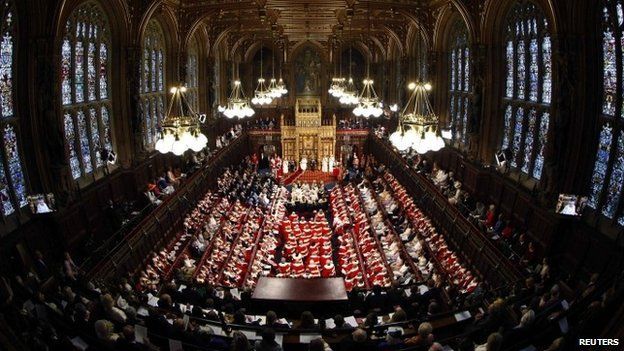Peers fight for space in crowded House
-
Published

Despite calls for a smaller upper chamber from all three main political parties and a large number of peers themselves, new appointments to the House of Lords are expected this week.
With 774 members, the House of Lords is already one of the largest parliamentary chambers in the world, second in size only to the Chinese National People's Congress.
The former Speaker of the House of Commons, Baroness Boothroyd, told the BBC the situation was "appalling."
She said: "It is so overcrowded that there is not enough space for about two thirds of us in the chamber itself. It is appalling. There is no commercial enterprise who would put up with what we put up with here."
The chamber is often very crowded as there is only enough space for around 230 members.
'Duty to retire'
Lady Boothroyd is calling for "proper reform", involving setting a retirement age or having a designated number of years a peer may serve.
"I wouldn't mind putting my hand up for a certain retirement age, because there comes a time when you've had enough here and there's a time to go."
This sentiment is echoed by Baroness D'Souza, the Lord Speaker of the House of Lords. "In practice it [the number of members] means that the chamber is very crowded. It means that there are sometimes rather unseemly fights… there is a lot of competition and a lot of resentment that builds out of that."
"I want to create a culture wherein it's seen as a public duty to retire in order to allow fresh blood to come in," she said.
The House of Lords Act 1999 removed the right of most hereditary peers to sit and vote in the House of Lords. As a result, membership dropped from 1,210 to 690. Since then, however, numbers have steadily crept up again as prime ministers routinely appoint new members.
Lady Boothroyd explained: "All prime ministers are very keen to put a lot of new members in here so that they get their legislation through, and they pile them in here. It's what I call lobby fodder."
Prime ministers are allowed to increase the number of peers, with the objective of creating an upper chamber which is reflective of the parties' general election vote.
Tony Blair handed out 374 peerages during his term in office; Gordon Brown awarded 34. Since 2010, David Cameron has made 162 appointments.
The UK is one of only three countries worldwide with a second chamber larger than the first, along with Kazakhstan and Burkina Faso, and heredity is the primary basis for upper chamber membership in only one other country in the world - Lesotho.
There is no statutory limit on the number of new peerages. With the lack of political consensus over the details of reform leading to an absence of radical change, the chamber could continue to receive new batches of "lobby fodder" for a while to come.
Lady Boothroyd and Lady d'Souza were interviewed for BBC Radio 4's World at One, broadcast at 13:00 BST on Monday, 4 August. It is available to listen to again on the BBC iPlayer.
-
-
Published19 June 2014
-